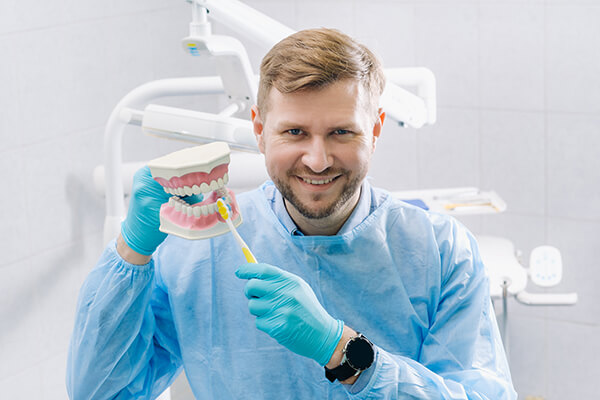Why You Ought To Choose a Regional Dentist Eugene for Personalized Care
An Overview to Usual Dental Conditions That Require a Dental practitioner's Treatment
Toothaches, for instance, can be symptomatic of serious concerns such as cavities, cracked teeth, or abscesses, each requiring particular treatments like dental fillings or root canals. Impacted knowledge teeth and jaw conditions can present significant pain and problems.
Toothaches
Toothaches are a common oral condition that can vary from moderate discomfort to serious pain, often showing an underlying concern that requires specialist attention. This discomfort can stem from a range of resources, including oral cavities, fractured or fractured teeth, and dental abscesses. Each of these problems positions substantial dangers if left without treatment, potentially bring about much more severe issues.
Oral tooth cavities, also recognized as cavities, are created by the accumulation of plaque that erodes tooth enamel, leading to openings or pits in the affected teeth. Abscesses are excruciating infections at the origin of a tooth or between a tooth and the periodontal, generally resulting from extreme decay or untreated dental caries.
Effective therapy of toothaches includes resolving the source. This may consist of fillings for tooth cavities, crowns for cracked teeth, or root canals and anti-biotics for abscesses. Early treatment by a dental expert can protect against more damage and minimize discomfort, guaranteeing optimum oral health and wellness.
Gum Tissue Disease
Periodontal disease, a widespread yet typically forgotten oral problem, manifests via inflammation and infection of the gums and sustaining cells. This condition mostly occurs in 2 phases: gingivitis and periodontitis. Gingivitis, the milder form, presents with signs such as red, puffy gum tissues that may bleed quickly throughout cleaning or flossing. If left untreated, gingivitis can progress to periodontitis, a much more serious kind identified by the damage of the sustaining bone and connective cells, ultimately causing missing teeth.
The key source of gum illness is microbial plaque, a sticky, anemic film that continuously bases on teeth. Poor dental hygiene, cigarette smoking, genetic proneness, and specific medical problems, such as diabetes, can intensify the threat of establishing gum tissue illness. Regular dental check-ups are important for early discovery and management of this condition.
Therapy for gum tissue condition varies from expert oral cleansing and scaling to even more advanced procedures like root planing and periodontal surgery, depending on the extent. Maintaining excellent dental hygiene practices, including brushing two times daily, flossing, and utilizing an antibacterial mouth wash, can substantially decrease the threat of gum condition and advertise healthier periodontals.
Tooth Cavities
Dental caries, additionally called tooth decays, are a typical dental problem identified by the damage of tooth enamel due to acid-producing microorganisms in the mouth. These bacteria grow on sugars and starches from food and drinks, producing acids that progressively wear down the enamel, resulting in dental caries formation.
Early-stage cavities might not show symptoms, but as they advance, they can cause tooth pain, level of sensitivity to warm or cold, visible holes or pits in the teeth, and staining. If left untreated, tooth cavities can permeate much deeper layers of the tooth, possibly resulting in extreme pain, infection, and also missing teeth.
Protecting against tooth cavities involves a combination of great dental hygiene methods and nutritional habits. Routine cleaning with fluoride tooth paste, flossing, and routine oral exams are essential. Dentists may likewise recommend extra preventative actions, such as fluoride treatments and dental sealers, to shield teeth from decay.
Treatment for tooth cavities relies on their extent. Small tooth cavities can be resolved with oral fillings, which recover the tooth's framework. More advanced cases may require crowns or also origin canal treatment if the degeneration has actually gotten to the tooth's pulp. Timely treatment by a dentist is important to avoid issues and preserve general dental health.

Impacted Wisdom Teeth
Affected knowledge teeth are a widespread dental issue that takes place when the third molars, frequently described as wisdom teeth, fall short to fully emerge or line up appropriately within the mouth. This condition commonly arises from insufficient space in the jaw or an uncommon growth angle of the teeth. Impacted wisdom teeth can cause a variety of problems, including damages, infection, and discomfort to adjacent teeth.
When wisdom teeth end up being affected, they are frequently partially emerged or stay totally beneath the gum line. This partial eruption can create a pathway for bacteria to enter the gums, causing infections that show up as swelling, discomfort, and also have a peek at this website high temperature. Additionally, affected wisdom teeth can exert pressure on neighboring teeth, potentially causing crowding or moving.
An extensive oral exam, commonly entailing X-rays, is essential for diagnosing impacted wisdom teeth. Normal oral examinations are suggested to keep an eye their explanation on the condition and keep dental health.
Jaw Disorders
Jaw disorders, collectively called temporomandibular joint (TMJ) problems, incorporate a variety of problems that influence the jaw joint and surrounding muscular tissues. These disorders can show up via signs and symptoms such as discomfort or inflammation in the jaw, trouble eating, a clicking or popping noise when opening up or shutting the mouth, and also persistent frustrations. TMJ conditions can arise from numerous variables, including arthritis, jaw injury, or habitual behaviors like teeth grinding or jaw clenching.
Medical diagnosis of TMJ problems typically involves a thorough evaluation by a dental practitioner, consisting of a physical exam of the jaw, oral X-rays, and sometimes progressed imaging techniques like MRI or CT checks to analyze the joint's condition. Treatment choices vary depending upon the seriousness of the problem. Non-invasive approaches such as physical therapy, dental splints, and medicines intended at decreasing swelling and discomfort are typically first-line treatments. In a lot more serious instances, surgical interventions might be needed to deal with structural concerns within the joint.
Very early treatment by an oral professional is vital to stop the development of TMJ problems and to keep general oral wellness. Patients experiencing consistent jaw pain or disorder ought to look for timely examination and treatment.
Final Thought
Preserving dental wellness requires prompt expert treatment to address typical oral site web conditions. Toothaches usually suggest underlying issues such as tooth cavities, broken teeth, or abscesses, requiring punctual treatment. Periodontal condition, from gingivitis to periodontitis, demands normal oral check-ups and cleansings to prevent progression. Influenced wisdom teeth and jaw conditions additionally call for professional focus to alleviate discomfort and stop more issues. Regular oral sees are important for diagnosing and treating these conditions, ensuring total oral wellness and wellness.
Oral cavities, likewise known as caries, are created by the accumulation of plaque that deteriorates tooth enamel, leading to holes or pits in the influenced teeth. Abscesses are unpleasant infections at the root of a tooth or in between a tooth and the periodontal, commonly resulting from extreme degeneration or unattended cavities.

In addition, influenced wisdom teeth can put in stress on surrounding teeth, possibly triggering crowding or shifting.